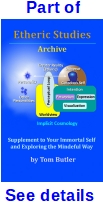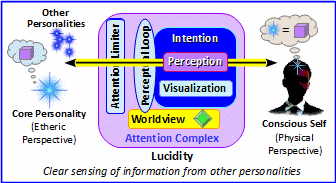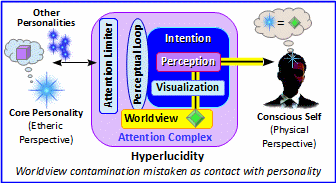Seeking 101
 Think of yourself as two people sharing the same body. One is your inner seeker, ever striving to be at one with nature and your spiritual self. The other is your outward human that is driven by the instinct to assure the continuation of the gene pool. Both of you must live together. Your human must be successful, but your inner seeker will want that success to come without violating others.
Think of yourself as two people sharing the same body. One is your inner seeker, ever striving to be at one with nature and your spiritual self. The other is your outward human that is driven by the instinct to assure the continuation of the gene pool. Both of you must live together. Your human must be successful, but your inner seeker will want that success to come without violating others.
This idea of two purposes is described very well in the Katha Upanishad. It is thought to have been written 6,000 years ago but is known to have been based on even older oral tradition of the Indus Valley. I have tried to make sense of that story in the essay, The Razor’s Edge (ethericstudies.org/razors-edge/). The Katha Upanishad is a good example of many such systems of thought arguing that we have a choice between following the way of our human or the way of our inner seeker. We all have that choice. Few follow the way of the inner seeker.
Now think of your inner seeker as having three perspectives. One perspective is your conscious self which is who you consider yourself to be, your I think I am this. Your conscious self is the experiencer.
Your second perspective is your immortal personality which is the observer of your experiences and source of your purpose. It is your I am this as the core intelligence binding the parts of your life field as one.
Think of your third perspective as your Attention Complex. It is the origin of your perception and expression. All information from the world first comes to your Attention Complex where it is compared to your worldview. The result of that comparison is what you consciously sense. You do not directly see, hear, feel, taste what your body senses. You experience what your Attention Complex thinks of what your body senses. Think of this third perspective as your judge.
When we are born into this lifetime, entanglement with our human includes sharing its worldview. That means we begin mostly under the influence of our human’s instincts. Yes, we have the spiritual urge, call them spiritual instincts, to gain understanding, but our experiencer is mostly under the influence of our human and what we are being taught. It is usually much later in life that our spiritual instincts begin to dominate … if at all.
An important assumption in Spiritualism is that we experience a physical lifetime to gain understanding about the nature of reality as it is represented in this venue for learning. In that view, every experience—good or bad—is considered an important opportunity to gain understanding. This is the essential message of Principles 1-3 and 7 of the Declaration of Principles. It is our inner seeker—our experiencer—that follows the urge to gain understanding.
Our inner Judge is hardwired to present information to us as it is framed by what we have been taught is true. Our typically dominant human’s instincts are fine-tuned to turn us toward seeing and doing what is best for physical survival. Our task is to manage our attention so that we can notice the underlying meaning of life experiences. How well we manage those distractions is referred to as lucidity.
According to the Gale Encyclopedia of Occultism & Parapsychology, Lucidity is a term that was used in the early 1800s to describe the human abilities to sense subtle energy. It is used in the same sense as lucid dreaming or clear sensing. I have learned to think of the conscious process of becoming lucid as the Mindful Way. Here is how I framed this objective on the back cover of Exploring the Mindful Way:
Immortal Self-Centric Mindfulness
The most important understanding seekers of spiritual maturity must come to is the difference between lucidity and hyperlucidity. Lucidity is the degree to which we are able to clearly sense information from our mostly unconscious mind. Hyperlucidity is a term used in the Implicit Cosmology for a complex of behaviors motivated by the belief we are lucid when we are actually only sensing what we have been taught to expect.
The second most important understanding is that lucidity is the seeker’s objective, but that it is achieved in small steps. The only real conscious influence we have on our mostly unconscious mind is the expression of intention. This means that we must learn to consciously examine what we think is true. Mind changes only slowly, and so, the seeker’s objective is to habitually express the intention to align perception with the actual nature of reality.
… the process of consciously seeking greater lucidity can be referred to as the Mindful Way. Many people practice mindfulness simply to improve personal wellbeing. A few step onto the Mindful Way to seek greater understanding of their immortal nature and the nature of the reality they inhabit. Even fewer remain as wayshowers for those who seek greater lucidity….
Will you be a wayshower?

Lucidity is not something that one simply decides to have. From my experience, we gain lucidity as a lifelong process of learning to habitually try to understand our experiences. Throughout history, sages have advised their students to learn everything that can about everything as a part of daily life. For instance, as we walk, we casually look at the world around us. As we do, we distinguish between familiar and unfamiliar. In principle, things are familiar because we know about them. We try to understand the unfamiliar. That is, we go through a process of examining our memory to see if we have recollection of it or something similar. In effect, we allow the unfamiliar into our awareness so that it becomes part of the familiar.
Ask yourself how much you know about the familiar around you. Understanding is relative. Your first exposure to an idea brings a little understanding. The idea becomes familiar. For example, you might be introduced to a new person. The introduction makes them familiar. You have a degree of understanding about who they are. However, after working with the person for a few years, that understanding becomes much more complete … not completer, but more.
The sages tell their students to increase their understanding about the familiar through contemplation of the underlying relationships. As a practical matter, increasing understanding means greater lucidity. The effect is increased ability to sense reality as it is without making it what we have been taught.
I want to leave you with a cautionary note. We think of being lucid as being able to sense information from our spiritual world before it is colored by worldview. That is clear sensing. Think of when people think they are clear sensing, but in actuality, are only listening to the world according to their worldview, as hyperlucidity.
Here is how I defined hyperlucidity in Your Immortal Self:
A short-term change in behavior marked by the tendency to find phenomena everywhere despite considerable testimony to the contrary by peers. The concept comes from occasional reports of odd behavior exhibited by some people when they visit an emotionally charged place (Paris syndrome, Jerusalem syndrome) or experience great beauty (Stendhal syndrome). The effect is the experiencer’s mistaken belief in experiencing paranormal phenomena such as reporting voices in recordings when there are none, seeing features in featureless visual media and misattributing thoughts as transcommunication.
This condition is curable with education. I teach the Mindful Way as a cure.

If you are a Spiritualist because of an interest in mediumship, remember that your loved ones are only a thought away. However, if you are not able to listen, then they may as well be beyond your sensing. Develop your ability to listen by following the sage’s advice to develop lucidity.
![]()


Tom as usual you are right on top of forth coming knowledge. The mindful way is bringing to all what Spiritualist have let go of in our teachings. Most seekers today are wanting to be a medium to make money and that is not what Spiritualism is all about.
Everyone can get there own guidance from there own guides. That is what mindfulness is all about. I have been a Spiritualist for a good 60 years and your knowledge is so empowering to me. Keep up the good work.
Thanks, Nancy, it is good to have a little feedback. Without it, there is a danger that I am the one who is confused.